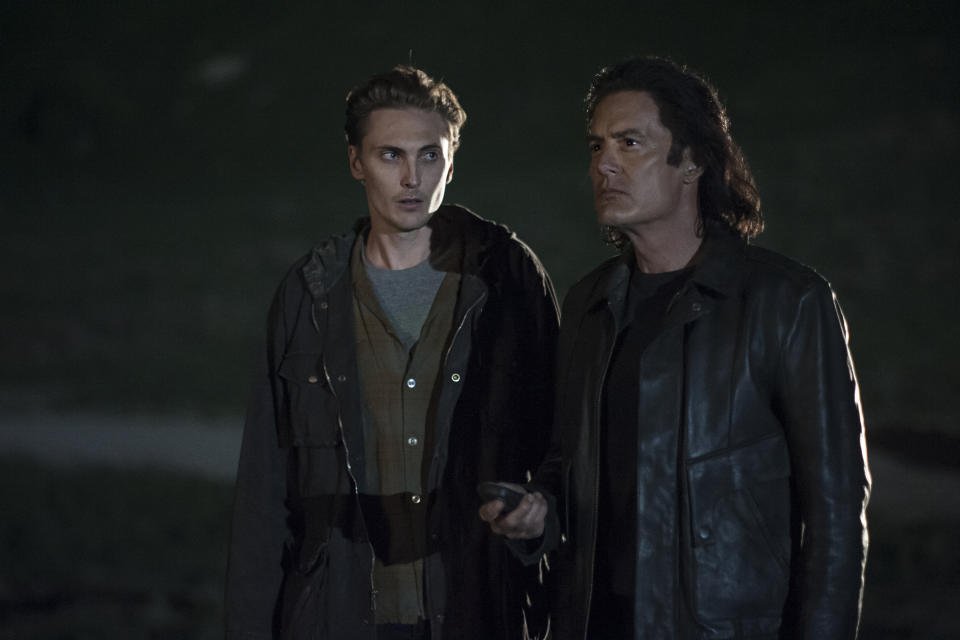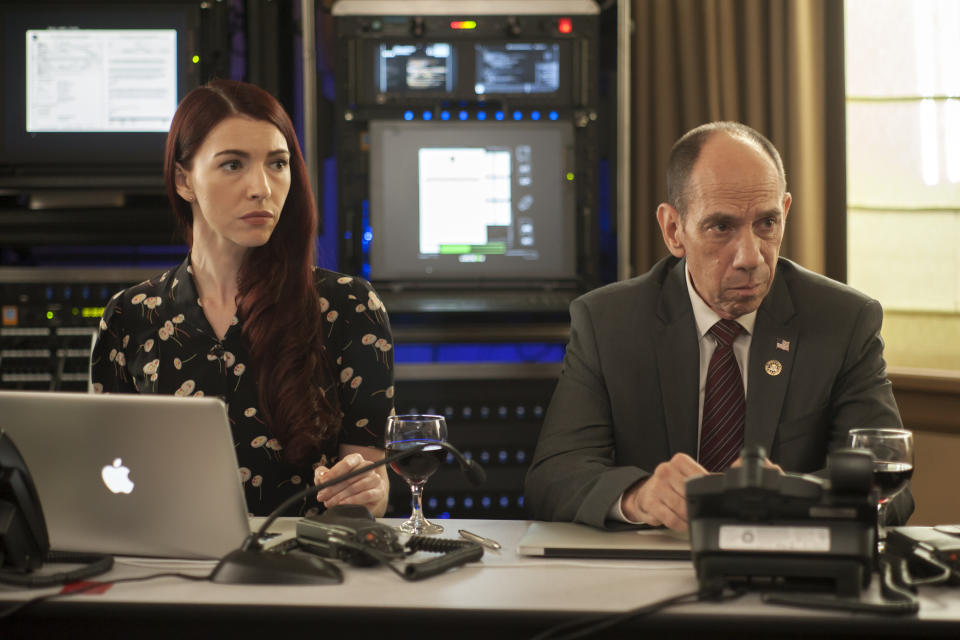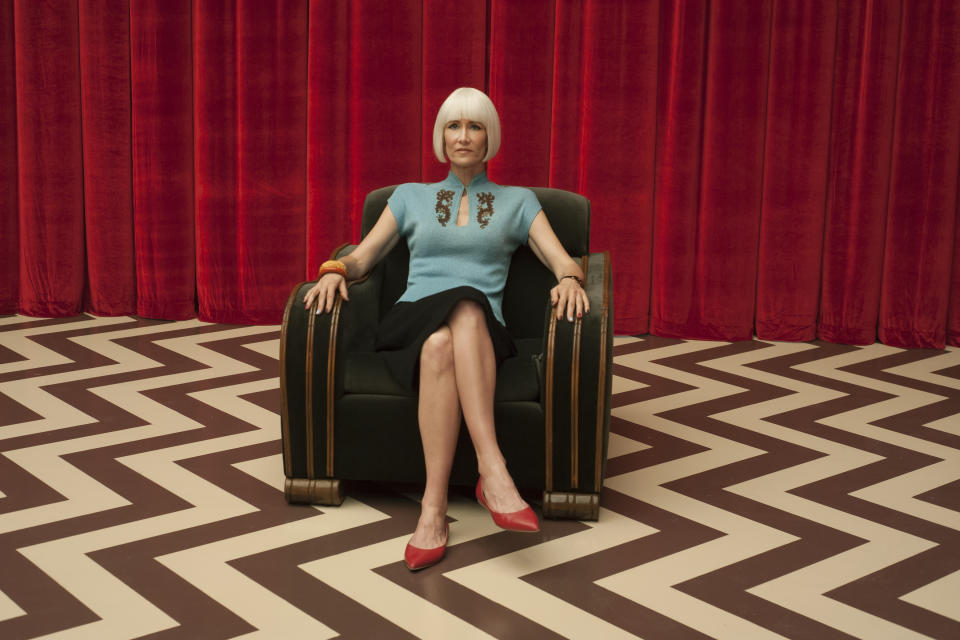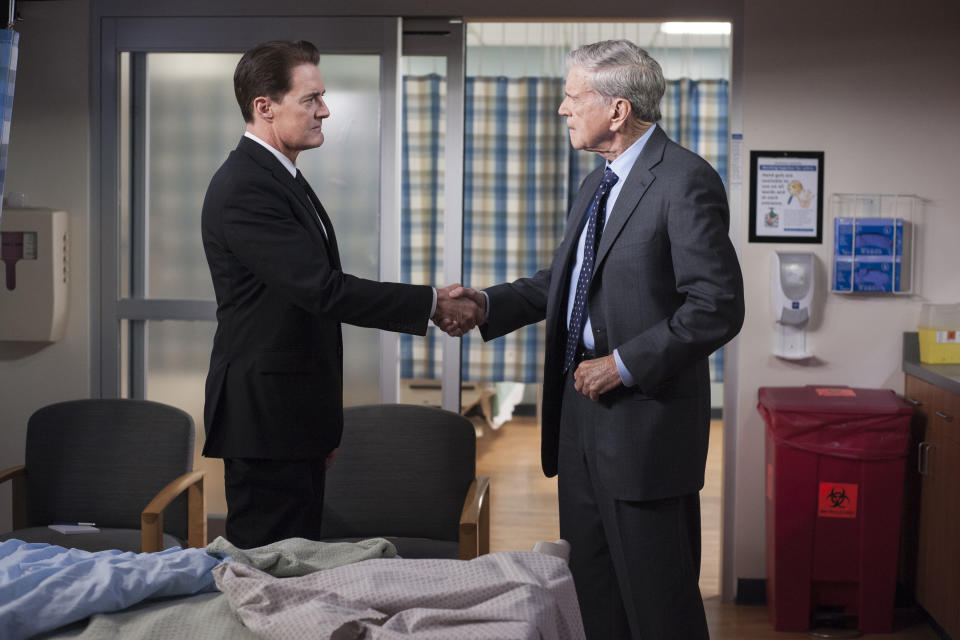'Twin Peaks' Part 16 recap: Wake up and smell the coffee

Warning: This recap for Part 16 of Twin Peaks contains spoilers.
When the news broke that Twin Peaks was happening again, nobody was quite sure what to expect. “Keeping the mystery alive” became somewhat of an unofficial motto of David Lynch and Mark Frost who tried tirelessly to keep character and plot details under wraps. Eager fans who traveled to filming locations in hopes of catching a glimpse of the action were urged to refrain from sharing information online. The only thing we could glean with any sense of confidence was that Kyle MacLachlan would be reprising his role as Special Agent Dale Cooper. MacLachlan was in all the promotional material (in his slick black suit); he was the first, and for a while, only confirmed cast member, and he was the only actor who had read the entire 500+ page script. Regardless of what else Lynch and Frost had in store for us this season, we were safe in the knowledge that our trusty agent Dale Cooper would be there to guide us through the wonderful and strange.
Oh, how wrong we were.
Thirteen episodes after being sucked into an electrical outlet and puffed out into a Las Vegas model home, it was finally time for Cooper to wake up and smell the coffee. I’m not too proud to admit that I had a tear in my eye when Coop awoke from his coma fully cognizant and aware of himself and his surroundings. In a series obsessed with electricity, this moment was as electrifying as they come. But the immense catharsis of this Cooper comeback wouldn’t have had half the impact if not for the journey the character took to get to this point. The build-up and the teases and the time spent readjusting to life after 25 years trapped in the Red Room all contributed to the heart-pounding exhilaration contained within this episode where characters woke up, faced reality and confronted the sometimes ugly truth of their situation.

A PLACE
Mr. C (Kyle MacLachlan) and Richard Horne (Eamon Farren) take a night time road trip to what the evil doppelganger refers to as “a place.” Once again Lynch uses these foreboding shots of the highway illuminated by the glow of headlights, driving us into the dark unknown. Mr. C pulls up on a dirt road where a large rock sits atop a hill; in an alternate reality, this would make the ideal destination for a father-and-son picnic outing. “Three people have given me coordinates to that place. Two of the coordinates match. What would you do, Richard?” Mr. C asks. “I’d check out the two that match,” Richard replies, in the first and last bonding moment between parent and child. Mr. C’s question is more than a mere hypothetical, as he tasks Richard with climbing the rock to pinpoint the exact location of the coordinates.
Meanwhile, across the way, a bewildered Jerry Horne (David Patrick Kelly) emerges from the darkness, running towards the camera like Michael Palin at the beginning of Monty Python’s Flying Circus. He’s ecstatic to see signs of possible life after weeks lost in the woods, but he struggles with a pair of binoculars, unable to make out quite what is happening. If he’d used the correct lens, he’d have seen his grand-nephew Richard evaporated into an electric dust cloud, like a Doctor Who regeneration gone tragically wrong. It’s the first instance of electricity in a fully charged episode where an electrical current runs under each of the big moments.
Richard’s yelps of pain and subsequent explosion are simply met with a “tut” from Mr. C. “Goodbye, my son,” he says before leaving, seemingly confirming once and for all that he spawned the evil bastard. There is no feeling of regret or sadness on the part of Mr. C, in fact, there is little feeling at all, other than the satisfaction that he avoided the trap. He didn’t care that it was his own child he sent into the fiery rock. Before getting back in the truck, he sends another text to Diane that reads: “: – ) ALL.” Yes, Evil Coop uses emoticons.

BUCKHORN, SD
Upon receiving the text, Diane (Laura Dern) gasps in horror, as if the message triggered a deep-buried memory. “I remember,” she whispers to herself, before sending another set of coordinates to Mr. C. It’s almost like a fight is taking place within Diane; something is obviously very wrong. She checks that she has her gun and then leaves the bar. That pitched down version of the Muddy Magnolias’ “American Woman” starts playing, the same one which accompanied Mr. C’s introduction in the premiere. The sense of dread is palpable as Diane makes her way up the elevator to Gordon Cole’s (David Lynch) room. It becomes clear what “ALL” means, Diane has been ordered to shoot Gordon, Albert (Miguel Ferrer), and Tammy (Chrysta Bell).
But before Diane attempts to take out the FBI, she has her own moment of awakening and confrontation with reality. She finally tells the Blue Rose crew about the night Cooper (Mr. C) came to visit. It was four years after he disappeared; he turned up in her living room, no knock, no doorbell. He grilled her about Bureau news before leaning in for a kiss. But when their lips touched she knew that “something went wrong.” When he sensed her fear, he smiled, just like BOB (Frank Silva) used to do, and it makes you wonder if the smiley emoticon was an intentional trigger. She then confirms what many fans suspected; he raped her.

It’s a brutal revelation, but before we can even begin to digest it, Diane starts to remember more, about how Mr. C took her to “an old, old gas station” (the malevolent convenience store). “I’m in the Sheriff’s Station,” she repeats, seemingly flittering in and out of this reality and another. “I’m not me,” she cries, before reaching for her gun and aiming it at Gordon. Albert and Tammy clock what is happening and fire at Diane before she can pull the trigger. The bullets hit her chest, and her body is sucked out of the room, much like how Laura (Sheryl Lee) disappeared in the premiere. She winds up in the Red Room, just like OG Dougie Jones, face-to-face with The One Armed Man (Al Strobel). With one last “f*** you,” her face cracks open, releasing a puff of black smoke and a gold ball, before vanishing in a surge of electricity.
Laura Dern is absolutely sensational in this scene, delivering a monologue packed with both emotional weight and intense panic. The way she can contort her face to give each line reading its own unique feeling never ceases to blow me away. It’s no wonder Lynch keeps the camera close on her face. But the implications of this scene are even more shocking. The Diane we’ve been seeing is a tulpa. On the surface, that means this Diane was manufactured, and the real Diane is somewhere else; she kept repeating that she’s in the Sheriff’s Station, could that mean she is somehow Naido? Beneath the surface, a tulpa is a perfect representation of a person broken apart. Diane had repressed the horrific memory of what Cooper (Mr. C) had done to her, in the same way many people cope with traumatic events. She lost a part of herself that day.

LAS VEGAS
For a while, there was a theory that the scenes in Las Vegas were happening in an alternate timeline or perhaps some kind of manufactured reality. That idea was put to bed a long time ago, but there is a dreamlike quality to this skewed suburban setting where even the names sound oddly fictitious (Janey-E and Sonny Jim I’m looking at you). “The f**k kind of neighborhood is this?” Bradley Mitchum (Jim Belushi) asks after witnessing an Uzi toting neighbor gun down Hutch (Tim Roth) and Chantal (Jennifer Jason Leigh) for parking on his driveway. Rodney (Robert Knepper) has a simple answer to his brother’s question: “People are under a lot of stress, Bradley.” Not a dream or an alt-reality or any supernatural shenanigans, just… stress.
The only person in Vegas living a manufactured reality was also the person living stress-free. In his brain-frazzled state, Cooper unwittingly took on the mistaken identity of Dougie Jones and shuffled his way through life without a care until a sudden moment of clarity led to him jamming a metal fork into a plug socket. Now in a coma, Cooper is visited by all the friends he made on his road to recovery, much like Dorothy in The Wizard of Oz. Janey-E (Naomi Watts) and Sonny Jim (Pierce Gagnon), the wife and son he never had who made his heart so full. Bushnell Mullins (Don Murray), the boss that believed in him and pushed him to use his brain to crack the case. And the Mitchum Brothers, the gangsters-with-hearts-of-gold who he faced with courage and earned their respect.
Personally, I’ve loved spending time with Dougie Jones just as much as these characters have. Rather than view the Dougie storyline as a lack of Cooper, I saw it as a rebirth; Cooper stripped back to his pure childlike essence, relearning all his loves and desires and the things that make him intrinsically Coop. The smile that crossed his face with every blissful bite of cherry pie or sip of coffee. The tender moments with Sonny Jim. His forceful takedown and disarmament of Ike the Spike. The way that he brought comfort and happiness to all those around him. It’s not that Coop of old had disappeared, it’s just that much like Jerry Horne and his binoculars, we were viewing him through a different lens.

If Cooper was always present beneath the Dougie delirium, then it’s no surprise that when he wakes from his coma, “100 percent” operative, he remembers it all, including everything that happened to Dougie. He speaks with The One Armed Man, who informs him that “the other one” didn’t go back in, and he hands Cooper the Owl Ring. “Do you have the seed?” Cooper asks. The One Armed Man presents the gold ball used to manufacture the original Dougie. Plucking a strand of hair from his scalp, Cooper gives his first order: “I need you to make another one.” Cooper of old is back, full of urgency and purpose, and true to his nature, his first act is a selfless one. Presumably, he’s asking for another Dougie for Janey-E and Sonny Jim, knowing that he’s going to have to leave them behind. Hopefully the new Dougie will have better dress sense and fewer gambling problems.
The doctor (Bellina Logan, who played Great Northern desk clerk Louie Budway in the original series) gives Cooper the all clear. He’s soon back on his feet and in his suit, giving orders in that charming and reassuring Cooper way. He tells Janey-E to bring the car around front. He asks to borrow the .32 snubnose Bushnell keeps in a shoulder holster under his left arm. He gets the Mitchum Brothers to gas up the jet and be ready to fly to Spokane, Washington. As if the scene couldn’t get any more satisfying, Angelo Badalamenti’s Twin Peaks theme begins, and I couldn’t stop grinning. “What about the FBI?” Bushnell asks. Cooper responds with perhaps the line of the series: “I am the FBI.”

A round of applause again for Kyle MacLachlan who instantly snaps back into Classic Cooper mode, differentiating him from both the fumbling Dougie and the brooding Mr. C. It’s everything from the facial movements to the speeded up speech pattern to the assured delivery. In lesser hands, a line like “I am the FBI” could have come across trite and corny, but not only has the series earned that payoff, but MacLachlan delivers it with such conviction that it’s a real jump off the sofa and punch the air moment. Welcome back, Agent Cooper.
But there are still other matters to tie up before he can jet off to Twin Peaks with the Mitchum Brothers in tow. Cooper has to deal with the reality of his situation, and that is saying goodbye to a family who, for the last however many weeks or months, believed this man to be their husband and father. In contrast to Mr. C, who sent his son into the heart of danger and merely shrugged at his death, Cooper takes responsibility for his loved ones. “You both made my heart so full,” he says as he bids an emotional farewell to Janey-E and Sonny Jim, and it’s clear that he means it. He was present the entire time, whether playing catch with Sonny Jim or having sexy time with Janey-E. “Whoever you are, thank you,” Janey-E tells him, understanding that this stranger is not the man she thought him to be but accepting the positive influence he had on their lives. Before he leaves, Cooper makes a promise, “The next time I walk through that red door, I’ll be home for good.” But will it be Agent Cooper returning or another Dougie doppelganger? It’s a cliffhanger that I’m not expecting a decisive answer to.
TWIN PEAKS OR SOMEWHERE ELSE
As we’re accustomed to by now, the episode ends in Twin Peaks at The Roadhouse. Or at least what we’ve been led to believe is The Roadhouse. Tonight’s act is Edward Louis Severson (aka Eddie Vedder), performing “Out of Sand,” a new song composed specifically for Twin Peaks. His words echo the themes of this episode, the notion of waking up to reality, revelation, change and the broken self. “I am who I am/ who I was/ I will never be again.”
But Eddie Vedder is not the headline act at The Roadhouse this evening. Enter Audrey Horne (Sherilyn Fenn) and her husband Charlie (Clark Middleton), finally in their coats and out of the house. Audrey scans the room in search for the missing Billy while Charlie orders two martinis at the bar. As they raise their glasses for a toast, the music stops, and the MC (JR Starr) makes an announcement: “Ladies and gentlemen, Audrey’s dance…” If you thought James (James Marshall) singing “Just You” at The Roadhouse was strange, then this is next level. Badalamenti’s iconic acid jazz beat kicks in, the dance floor clears, and Audrey, uncomfortable at first, starts to lose herself in the music. It’s weird as hell, but honestly, Audrey dancing under that purple hue with the crowd slowly swaying behind her is one of my favorite images of the entire series.

However, this moment isn’t mere nostalgia; there is something else going on here. Audrey’s dance is interrupted by a man yelling “That’s my wife, a**hole” to a fellow patron, smashing a bottle over his head. Panicked, Audrey runs towards Charlie, screaming “Get me out of here!” And then SNAP! In the same episode where her son died, where her former crush woke up, and where Diane came to terms with who and what she was, Audrey is also reactivated. We’re now somewhere else entirely. In a white room where Audrey, also dressed in white, stares into a mirror, seemingly just as confused as we are. “What? What? What?!” she screams as electricity crackles in the background. In the words of Tammy Preston, “Wow.”
From the moment Audrey appeared this season, many fans believed that she wasn’t herself, that her reality was false, perhaps the result of a coma dream. While I still don’t believe she is in a coma — that doesn’t add up with her giving birth to Richard — it is now obvious her reality is not what it once seemed. My guess, what with the all white room, is that she is in a psychiatric hospital and Charlie is her doctor. If that is the case, and Audrey is imagining/dreaming her life outside the hospital, are all the other Roadhouse scenes also part of her imagination? The other possibility is that Audrey is also a tulpa, and the sound of electricity certainly points to a more supernatural answer. If Mr. C created a duplicate Diane after visiting her, what would stop him from creating an alternate Audrey?
A stunning end to arguably the finest hour of Twin Peaks: The Return so far. It was an episode of payoffs and revelations that not only set up what should be a thrilling finale but which made the journey here all the more worthwhile.
Twin Peaks air Sundays on Showtime at 8 p.m.
Read More from Yahoo TV:
‘Game of Thrones’ season 7 finale recap: An epic downfall
MTV VMAs 2017: All the highlights
‘The Walking Dead’: 10 things you didn’t know about Lennie James
